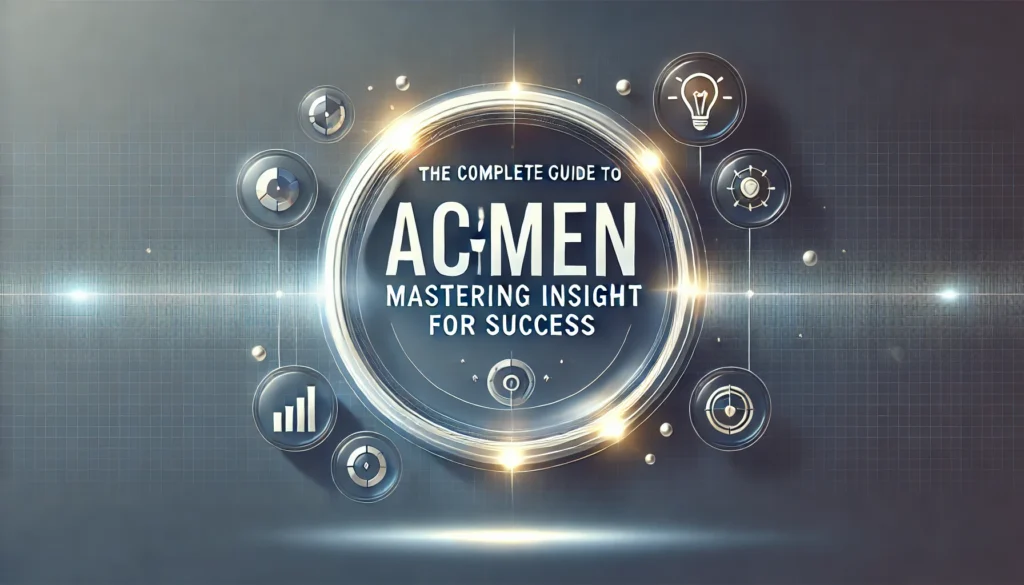Introduction
In today’s fast-paced world, acúmen stands out as a key quality that defines success in personal and professional spheres. Derived from the Latin word meaning “sharp” or “pointed,” acúmen refers to keen insight and the ability to make sound judgments quickly. Whether in business, personal relationships, or everyday decisions, developing strong acúmen can help navigate complexities with confidence and foresight.
What is Acúmen?
Acúmen is not just intelligence; it’s about having sharp discernment and practical wisdom to make effective decisions. This quality involves understanding situations deeply, anticipating outcomes, and acting wisely. From business leaders to everyday people, those who possess acúmen can quickly grasp complex issues, assess risks, and make choices that yield positive results.
Historical Development of Acúmen
The concept of acúmen has evolved over centuries. Initially, it was tied to wisdom and intellectual sharpness in philosophy. However, with industrialization and the rise of business, acúmen found broader applications. It shifted from merely intellectual sharpness to encompassing strategic thinking, emotional intelligence, and business awareness.
Acúmen vs. Other Forms of Intelligence
While terms like intelligence, intuition, and wisdom are often used interchangeably with acúmen, they are not identical. Intelligence focuses on mental capabilities, while intuition involves a gut feeling. Wisdom is tied to experience and judgment. On the other hand, acúmen blends all three—enabling individuals to grasp situations quickly and react strategically.
Types of Acúmen
Business Acúmen
The ability to understand and handle various business situations effectively.
Emotional Acúmen
Understanding and managing emotions, both one’s own and others.
Strategic Acúmen
Foresight in planning and making decisions that align with long-term goals.
Key Components of Acúmen
Understanding acúmen requires recognizing its key elements:
Financial Literacy
Knowing the numbers, from budgeting to forecasting, helps in making informed business decisions.
Strategic Thinking
Looking beyond the immediate and planning ahead for the future.
Market Awareness
Keeping up with industry trends, competitors, and changing consumer demands.
Emotional Intelligence
Recognizing and managing emotions for better decision-making.
Decision-Making Skills
Weighing pros and cons to make effective choices.
How to Develop Acúmen
Continuous Learning
Stay informed about your industry, read extensively, and take relevant courses. Learning expands your understanding and sharpens your thinking skills.
Critical Thinking
Ask questions, challenge assumptions, and view situations from multiple angles.
Gaining Experience
Take on new challenges. Real-life situations provide valuable insights that books can’t teach.
Networking
Surround yourself with knowledgeable people. Learning from others’ experiences adds to your understanding.
Reflection
Regularly evaluate your decisions to identify what worked and what didn’t. Reflecting on past actions enhances future decision-making abilities.
Technological Advancements and Acúmen
Technology, like artificial intelligence and big data, has changed the landscape of decision-making. AI can process vast amounts of information quickly, aiding in the decision-making process. By staying updated on technological advancements, individuals can enhance their acúmen and remain competitive.
Applications of Acúmen
The benefits of acúmen are vast. In business, it helps leaders foresee challenges and seize opportunities. In personal relationships, acúmen aids in understanding others’ emotions and intentions, building stronger connections. Additionally, it enhances problem-solving skills across various aspects of life.
Challenges in Developing Acúmen
Developing acúmen can be challenging. Common obstacles include:
Cognitive Biases
Preconceived notions can cloud judgment.
Fear of Failure
Worrying about making mistakes can hinder decision-making.
Resistance to Change
A rigid mindset can stifle growth and adaptability.
Overcoming these challenges requires a commitment to self-awareness, continuous learning, and a willingness to step out of comfort zones.
Ethical Considerations of Acúmen
While acúmen offers numerous benefits, ethical considerations are crucial. Leaders and individuals must use acúmen with integrity, empathy, and a sense of responsibility. Misusing this skill for manipulation or unethical purposes can lead to harm. True acúmen involves making decisions that are not only effective but also ethical.
Acúmen in Crisis Management
When crises arise, acúmen becomes invaluable. Leaders with strong acúmen can quickly assess situations, remain calm, and make critical decisions under pressure. They can analyze risks, foresee potential outcomes, and steer their teams through turbulent times with confidence.
Measuring Acúmen: Tools and Techniques
Assessing acúmen can be subjective, but there are tools available, like cognitive aptitude tests and situational judgment assessments. These help in understanding one’s level of insight and decision-making abilities. However, self-reflection and introspection are equally important for self-evaluation.
Acúmen in Leadership
Leaders with acúmen inspire, influence, and innovate. They possess a deep understanding of human behavior, market trends, and organizational dynamics, enabling them to drive growth and inspire confidence in their teams. Leaders like Steve Jobs and Elon Musk are known for their strategic vision and ability to make bold decisions based on strong acúmen.
Real-World Success Stories with Acúmen
Throughout history, figures like Sun Tzu, known for his military strategies, and Warren Buffett, famous for his financial decisions, exemplify how acúmen can influence events and leave a lasting legacy. These individuals applied their keen insight to shape outcomes and build a name for themselves.
The Future of Acúmen
As society evolves, so does the concept of acúmen. With advancements in technology, increasing globalization, and rapid changes in the job market, individuals must adapt and refine their acúmen to remain competitive. Embracing lifelong learning and adopting new tools will be key to thriving in an interconnected world.
Conclusion
In conclusion, acúmen is not just about being sharp or smart—it’s about understanding situations deeply, making informed decisions, and acting with foresight. By developing acúmen, individuals can enhance their ability to navigate the complexities of life, build stronger relationships, and achieve personal and professional success. It’s a skill that evolves with experience and deliberate practice, making it essential in our ever-changing world.
FAQs
- What is acúmen?
Acúmen, derived from the Latin word meaning “sharp” or “pointed,” refers to keen insight and practical intelligence. It involves a mix of perceptiveness, intuition, and the ability to make sound judgments swiftly. - Why is acúmen important in today’s world?
Acúmen is crucial in our fast-paced world where quick decision-making is essential and information overload is common. It helps individuals effectively manage various aspects of life, from personal relationships to career advancement. - How can one develop acúmen?
Developing acúmen involves continuous learning, critical thinking exercises, gaining practical experience, networking with knowledgeable individuals, and reflecting on one’s decisions and actions. These practices enhance one’s ability to understand complex situations and make informed decisions. - What are the applications of acúmen?
Acúmen finds applications in business, finance, politics, personal relationships, and problem-solving. It enables individuals to navigate challenges, seize opportunities, and drive innovation in organizations. - How does acúmen benefit leadership?
Leaders with acúmen possess a deep understanding of human behavior, market dynamics, and organizational strategies. This enables them to inspire others, make strategic decisions, and foster growth and innovation within their teams and organizations.


